Research Roundup highlights the work of faculty in the Division of Social Sciences. For ongoing coverage of UCSC research, please visit the UCSC Newscenter and Social Sciences News.
Anthropology
Professor Nancy Chen published "Making Memories: Chinese foodscapes, medicinal foods, and generational eating” in the peer-reviewed journal Memory Studies, which explores how contemporary Chinese foodways and medicinal recipes connect with past times as well as convey cultural memory. Commencing with recent memories of the first SARS coronavirus, Professor Chen examines through two case studies how Chinese memory worlds are defined by medicinal foods that are featured not only in museums, but also keenly held as part of everyday dietary practices throughout pandemics. Despite the proximity of memories of food insecurity, the intergenerational preparation and sharing of meals continue to mark social identity and belonging. The realms of medicinal foods and recipes reflect longstanding notions of health that are being promoted in contemporary China. Altogether, these arenas suggest that foodscapes, particularly medicinal foods, offer key assemblages of food memory, time, and wellbeing.
Associate Professor Mayanthi Fernando lead-authored Distribute 2020: A Playbook, a guide for organizing virtual academic conferences. The Playbook was based on lessons learned from Distribute 2020, the joint biennial of the Society for Cultural Anthropology and Society for Visual Anthropology that she co-organized. Held May 7-9, the virtual event featured three days of streaming multimodal panels and keynotes from all over the world, a “global schedule” untethered to North American time (so that anyone anywhere could tune in to the “live” conference during their daylight hours), subtitles and captions for all panels and keynotes, a virtual hallway for participants to engage one another and the panelists, a $10 registration fee, and more than 1,100 participants from over 70 countries. The Playbook is a blueprint for creating this kind of conference experience: i.e., a virtual gathering of scholars, activists, and artists that is not only carbon-conscious but also highly accessible, radically international, and fundamentally democratic.
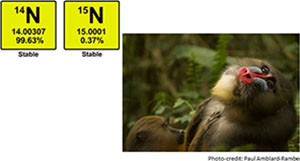 Assistant Professor Vicky Oelze published two papers on her work using stable isotopes to study the feeding ecology of wild primates in Africa. The study in the flagship publication Journal of Human Evolution investigates how hunting and meat consumption rates in two groups of wild chimpanzees (Pan troglodytes verus) from Cote d'Ivoire relate to the stable isotope values in their hair. The research team were surprised to find a less clear connection than previously suggested. Within a 6-month period, some males consumed up to 25kg of monkey meat, but their isotope values were indistinguishable to other chimps who merely ate scraps of meat. This finding has considerable implications for using stable isotopes to reconstruct meat consumption rates in ancient humans.
Assistant Professor Vicky Oelze published two papers on her work using stable isotopes to study the feeding ecology of wild primates in Africa. The study in the flagship publication Journal of Human Evolution investigates how hunting and meat consumption rates in two groups of wild chimpanzees (Pan troglodytes verus) from Cote d'Ivoire relate to the stable isotope values in their hair. The research team were surprised to find a less clear connection than previously suggested. Within a 6-month period, some males consumed up to 25kg of monkey meat, but their isotope values were indistinguishable to other chimps who merely ate scraps of meat. This finding has considerable implications for using stable isotopes to reconstruct meat consumption rates in ancient humans.
In collaboration with French and Gabonese scholars, Assistant Professor Oelze conducted a second stable isotope study on wild mandrills (Mandrillus sphinx) from Gabon, which was the first study to report evidence for nutritional stress in free ranging primates. The ones who seemed nutritionally stressed were mature male mandrills, who appeared to be heavily invested in securing mating opportunities, rather than maintaining energy balance.
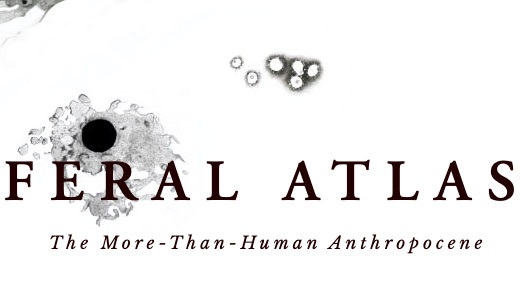 Distinguished Professor Anna Tsing curated and edited Feral Atlas: The More-than-Human Anthropocene, published by Stanford University Press. The project, which includes the work of more than 100 scholars, natural scientists, artists, poets, and designers, ties together research across the social sciences, natural sciences, arts, and humanities to put forward an original approach to the Anthropocene, the condition of human-caused environmental catastrophe. In its first week, Professor Tsing presented a colloquium for The Center for Cultural Studies, and 2,100 people signed up to attend, indicating of the breadth of interest in the project.
Distinguished Professor Anna Tsing curated and edited Feral Atlas: The More-than-Human Anthropocene, published by Stanford University Press. The project, which includes the work of more than 100 scholars, natural scientists, artists, poets, and designers, ties together research across the social sciences, natural sciences, arts, and humanities to put forward an original approach to the Anthropocene, the condition of human-caused environmental catastrophe. In its first week, Professor Tsing presented a colloquium for The Center for Cultural Studies, and 2,100 people signed up to attend, indicating of the breadth of interest in the project.
Coastal Science and Policy Program
Professor Anne Kapuscinski, serving as Committee Chair for an expert committee under the Board on Higher Education and Workforce and the Science and Technology for Sustainability Program, convened by the National Academies of Sciences, Engineering, and Medicine, has published Strengthening Sustainability Programs and Curricula in Higher Education. The report provides expert insights for strengthening the emerging discipline of sustainability in higher education in the United States; describes the local, national, and global landscape related to sustainability education; examines the history and current status of sustainability education programs in the United States and globally; discusses employment prospects for sustainability graduates in terms of the opportunities and the skills that employers seek; and addresses diversity, equity, and inclusion in sustainability-related education and employment.
Division of Social Sciences
Professor Julie Guthman published the first peer-reviewed article to come out of the UC Agri-food Technology Research Project (AFTeR). In the article, “Magical disruption? Alternative protein and the promise of de-materialization,” Professor Guthman and her UC Davis co-PI examine the claims made by alternative protein entrepreneurs who aspire to eliminate the environmental impacts of conventional livestock production and fishing. In websites, conferences, and interviews, these companies represent that they can make edible protein from (nearly) nothing, draw on abundant or mundane resources that will presumably not be missed, and “upcycle” byproducts that would otherwise be wasted. The article finds, however, that the processes of making alternative proteins are largely kept under proprietary wraps, while company representations of them are cartoonish, making it difficult, if not impossible, for the public—or anyone really—to meaningfully assess these promises of protein without environmental harm. The paper was published in Environment and Planning E: Nature and Space.
Professor Guthman also published an article in California Agriculture reporting on her ongoing research on the California strawberry industry through a USDA-funded collaborative project aimed at developing disease-resistant strawberry cultivars. “Strawberry growers are unlikely to forgo soil fumigation with disease resistant cultivars alone” investigates grower willingness to choose pathogen-resistant cultivars in order to reduce or potentially replace chemical soil fumigation. Drawing on a survey completed by 33 strawberry growers and in-depth interviews conducted with 20 growers, she found that most growers prioritize yield in choosing cultivars, despite the industry-wide problem with low prices. Few growers reported they would be willing to substitute disease-resistant cultivars for fumigation without fail-safe disease control methods, and many growers, even those with existing organic programs, would opt for soilless systems in a tighter regulatory environment.
Economics
Assistant Professor Jeremy West, Associate Professor Adam Millard-Ball (Environmental Studies), graduate student Nazanin Rezaei (Environmental Studies), and recent graduate Garima Desai coauthored a research report and policy brief for the University of California Institute of Transportation Studies. The study evaluates how local characteristics of the urban built environment—such as public transportation accessibility and parking availability – affect households' transportation choices and employment opportunities. It uses a natural experiment provided by San Francisco's affordable housing lotteries, which, in effect, randomly assign lottery-winning households to live in specific residences. One notable finding is that, in buildings with less on-site parking, households own fewer cars, drive less, and ride transit more. Transit accessibility also increases transit ridership, but residential parking has an even stronger influence. and
Professor Rob Fairlie published “The impact of COVID-19 on small business owners: The first three months after social-distancing restrictions” in the Journal of Economics and Management Strategy. Professor Fairlie also published “Early evidence of the impacts of COVID-19 on minority unemployment,” with Ken Couch and Huanan Xu, which was the feature article in the December issue of Journal of Public Economics.
Professor Fairlie, with Glenn Millhauser, Dan Oliver, and Randa Roland published "The effects of male peers on the educational outcomes of female college students in STEM: Experimental evidence from partnerships in Chemistry courses." Although previous studies have documented that female students self-report experiencing gender bias from male peers in STEM, importantly, the authors did not find evidence that female students are negatively affected by male peers in intensive, long-term pairwise interactions in their course grades or future STEM course-taking, providing hopeful news for future trends in female representation in STEM fields.
Professor Fairlie also received media coverage for his work in, among other organizations, The Washington Post, The New York Times, The Wall Street Journal, PBS, CBS, CNBC, USA Today, Bloomberg, BBC, Forbes, Vox, and National Geographic.
Finally, Professor Fairlie’s research was cited in a senate bill, the Minority Business Resiliency Act, introduced by Senators Schumer, Booker, Harris, and others; and a series of bills signed by Governor Gavin Newsom supporting small businesses impacted by the COVID-19 pandemic.
Professor Laura Giuliano is part of a multi-disciplinary team of researchers from six universities that received a five-year, $5 million grant from the U.S. Department of Education’s Institute of Education Sciences to support the National Center for Research on Gifted Education. The NCRGE’s research is aimed at informing stakeholders about: (1) tools to better recognize and harness untapped talent, especially among populations that are underrepresented in gifted and advanced academic programs, and (2) best practices to promote long-run academic success for academically talented students from all backgrounds. Working papers and progress reports will be posted on the center’s website for faster dissemination.
Distinguished Professor Michael Hutchison published “Market price effects of agency sovereign debt announcements: Importance of prior credit states,” with M. Binici and E. Miao, in the International Review of Economics and Finance. The paper investigates the price response to credit rating agency (CRA) announcements on sovereign bonds and characterizes credit rating events controlling announcements for the prior credit state—outlook, watch/review, or stable status as well as the level of the credit rating. Rating announcements provide a rich and varied set of information on how credit rating agencies influence market perceptions of sovereign default risk, but accurate measurement of these effects depends on conditioning for the prior credit state of the sovereign bond.
In Professor Hutchison’s paper “The global pandemic, policy space and fiscal rules to achieve stronger stabilization policies,” published in the Seoul Journal of Economics, he argues that deficit bias constrained discretionary fiscal policy actions arises from political economy factors and demonstrates that fiscal rules are an important instrument to mitigate deficit bias and restore countries to longer-term solvency. Countries with strong fiscal rules had much better fiscal and debt positions prior to the Great Financial Crisis, allowing them in turn to pursue much more stimulative fiscal policies in response to the crisis. The same situation faced policy makers at the onset of the pandemic economic crisis—those with strong fiscal rules were in a much better position to provide large fiscal responses to support the economy without endangering national debt solvency. Facilitating long-term fiscal solvency and allowing for larger discretionary fiscal actions in crisis situations provides a strong argument for the strengthening and enforcement of fiscal rules around the world.
Professor Hutchison also published “Fiscal procyclicality in emerging markets: The role of institutions and economic conditions,” in the journal International Finance, with M. Bergman. Procyclicality of fiscal policy is a common feature in emerging markets—by contrast with high‐income economies—and leads to greater business‐cycle amplitudes. In this paper, the authors employ dynamic panel methods in a large sample of countries to investigate what factors are associated with fiscal cyclicality, including a host of economic and institutional variables of especial import in emerging markets. They find that fiscal procyclicality is mainly due to procyclical fluctuations in government investment expenditure and is positively associated with government debt levels, terms‐of‐trade volatility, and costs of foreign borrowing, while negatively associated with better government efficiency. Findings show that fiscal rules associated with lower fiscal procyclicality and, in particular, balanced‐budget rules, may help mitigate the adverse cyclicality effects of high terms‐of‐trade volatility and government debt burdens in emerging markets.
Finally, Professor Hutchison’s paper “Facing the quadrilemma: Taylor rules, intervention policy and capital controls in large emerging markets,” with F. Chertman and D. Zink, in the Journal of International Money and Finance investigates extended Taylor rules and foreign exchange intervention functions, measuring the extent to which policies are designed to stabilize output, inflation, exchange rates, and accumulate international reserves, focusing on two large emerging markets: India and Brazil. They also expand the work to Chile and China for purposes of comparison. Chile’s policy functions are similar to Brazil, while China pursues policies that substantially diverge from other emerging markets.
Assistant Professor Alonso Villacorta published “Policies to support firms in a lockdown: A pecking order,” with Anatoli Segura, in Covid Economics, Vetted and Real-Time Papers. The authors analyze government interventions to support firms facing liquidity needs during a lockdown in a competitive model of financial intermediation. Banks and firms have legacy balance sheets at the lockdown date. Firms’ liquidity needs can be financed by banks that are subject to risk-weighted capital requirements and funded with insured deposits. An increase in firms’ overall claims to external investors aggravates moral hazard problems and reduces expected output. The government can support firms directly through transfers or indirectly through guarantees to new bank loans or reductions in the capital requirement. As a result of the diversification of idiosyncratic firm risks conducted by banks, a reduction in the capital requirement only creates costs for the government following negative aggregate shocks that lead to banks’ failure. A pecking order on the government policies maximize output as a function of the government’s budget.
Education
Associate Professor Lora Bartlett is leading a multi-institution research group looking at the ways state and local responses to the pandemic have reshaped schooling and teachers’ working lives, affected teachers’ work/family balance, and exacerbated as well as abated long-standing educational equity issues. In November, the Suddenly Distant Research Project released its first report from the field, Suddenly Distant: Teachers’ Work During COVID-19. The next report, due in January 2021, will coincide with the January 13, 2021 UCSC public forum Suddenly Distant and Still in Flux: The Implications of COVID-19 for K12 Teachers’ Work and Schooling. Details and registration for the forum on January 13 can be accessed through the registration link.
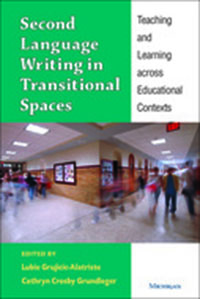 Professor George Bunch was featured in WestEd’s webinar series Perspectives on English Language Learning: Aída Walqui in Conversation with Leading Scholars. Drawing on his career as a researcher, teacher educator, and former high school teacher, he argues that robust and equitable learning opportunities for K-12 students classified as English Learners are more important than ever, given the current intersecting societal crises.
Professor George Bunch was featured in WestEd’s webinar series Perspectives on English Language Learning: Aída Walqui in Conversation with Leading Scholars. Drawing on his career as a researcher, teacher educator, and former high school teacher, he argues that robust and equitable learning opportunities for K-12 students classified as English Learners are more important than ever, given the current intersecting societal crises.
Dr. Bunch also published, with Dr. Daisy Martin (director of the History & Civics Project at UC Santa Cruz) “From ‘academic language’ to the ‘language of ideas’: A disciplinary perspective on using language in K-12 settings.” The article argues that traditional (and often prescriptive) notions of academic language in school settings lead educators to miss important intellectual contributions by linguistically minoritized students. Using student talk and writing in history classrooms as examples, the authors explore how focusing on a wider range of students’ linguistic resources can highlight their engagement with key disciplinary practices at the heart of instruction.
Finally, Dr. Bunch published “Policies impacting multilingual writers from high school to higher education: A guide for inquiry across contexts,” with UCSC Education Department doctoral candidate Heather Schlaman. The chapter, which focuses on policy and practice for multilingual students in California K-12 schools, community colleges, and four-year institutions, appears in a volume published by University of Michigan Press, Second Language Writing in Transitional Spaces.
Assistant Professor Roberto Santiago de Roock published “On the material consequences of (digital) literacy: digital writing and the limits of agency and affordances” in a Theory into Practice special issue, “Reconceptualizing Digital Writing”. In the paper, he argues that digital writing pedagogy needs to prepare students to deal with underlying oppressive realities within the range of everyday digital writing practices, as opposed to simply focusing on affordances as unfettered opportunities. Digital writing experiences are shaped by design around idealized users and hegemonic social forces, and are thus differentiated along intersectional lines. This has pedagogic implications as the context for understanding writing under contemporary racial technocapitalism, and critical design literacy is proposed as a way forward.
Professor and Chair of Education Cynthia Lewis published “Artists as catalysts: The ethical and political possibilities of teaching artists in literacy classrooms” in English Teaching: Practice & Critique. The article discusses two studies of the ethical and political possibilities offered by the presence of teaching artists and visual artwork in racially- and culturally-diverse high school English classrooms. Both studies demonstrate new ways of feeling, being, and thinking about difference, bringing to the forefront momentary possibilities and impossibilities of complex human and nonhuman intra-actions. The provocations flowing from the visual artwork and the dialogue presented opportunities for emergent and unexpected experiences of literacy learning.
Professor Judit Moschkovich published a book chapter, “Learners’ language in mathematics classrooms: What we know and what we need to know,” in N. Planas, C. Morgan, & M. Schütte (Eds.). Classroom Research on Mathematics and Language (Routledge).
Professor Judit Moschkovich served on the National Academy of Education panel Addressing Inequitable Mathematics Loss in the Midst of COVID-19: Mitigation and Learning Acceleration Strategies, part of the NAEd COVID-19 Educational Inequities Roundtable Series. Professor Moschkovich’s presentation focused on research-based strategies to support mathematics learning, particularly for students learning English. The roundtables informed NAEd summaries with evidenced-based strategies to prevent the deepening of educational inequalities.
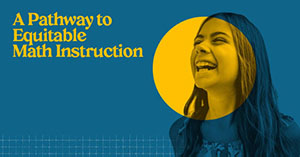 Professor Moschkovich was part of the advisory team for A Pathway to Equitable Math Instruction. This toolkit is an integrated approach to mathematics that centers Black, Latinx, and multilingual students in grades 6-8 and addresses barriers to math equity. The Pathway materials offer opportunities for ongoing self-reflection to develop an antiracist practice and support educators as they navigate the individual and collective journey from equity to antiracism.
Professor Moschkovich was part of the advisory team for A Pathway to Equitable Math Instruction. This toolkit is an integrated approach to mathematics that centers Black, Latinx, and multilingual students in grades 6-8 and addresses barriers to math equity. The Pathway materials offer opportunities for ongoing self-reflection to develop an antiracist practice and support educators as they navigate the individual and collective journey from equity to antiracism.
Environmental Studies
Professor Flora Lu published “Extraction, entanglements, and (Im)Materialities: Reflections on the methods and methodologies of natural resource industries fieldwork” in Environment and Planning E: Nature and Space. This multi-authored collection of papers examines the complex realities of research on natural resource industries, including the messy entanglements of extraction, materiality, and everyday social life this research entails. The pieces in this collection argue that research concerning extractive industries entails multiple scholarly positions—positions problematically inflected with colonialism and always shaped by power relations. Contributors draw largely from feminist, postcolonial, antiracist, and historical materialist insights to frame and problematize the corporeal and representational concerns arising from their scholarship on nature-intensive industries, including personal dilemmas that they have encountered in their work. Overall, the collection is driven by the realization that research, and the analyses it entails, may serve as a tool for emancipatory intervention, yet also reproduce inequality.
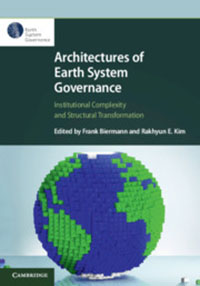 Associate Professor Sikina Jinnah published “International bureaucracies,” in Architectures of Earth System Governance: Institutional Complexity and Structural Transformation, published by Cambridge University Press. The chapter reviews recent scholarship on international bureaucracies and highlights the distinct ways in which they exert influence beyond their narrow functional mandates, specifically highlighting how international bureaucracies influence governance processes by deriving authority from structural characteristics of the international system, exerting influence from their ability to deliver specific administrative and governance functions and leveraging their organizational autonomy. It outlines empirical and conceptual gaps in our understanding of how international bureaucracies function in global environmental governance and argues that the dynamics of change in world politics may open new pathways of influence for these actors moving forward.
Associate Professor Sikina Jinnah published “International bureaucracies,” in Architectures of Earth System Governance: Institutional Complexity and Structural Transformation, published by Cambridge University Press. The chapter reviews recent scholarship on international bureaucracies and highlights the distinct ways in which they exert influence beyond their narrow functional mandates, specifically highlighting how international bureaucracies influence governance processes by deriving authority from structural characteristics of the international system, exerting influence from their ability to deliver specific administrative and governance functions and leveraging their organizational autonomy. It outlines empirical and conceptual gaps in our understanding of how international bureaucracies function in global environmental governance and argues that the dynamics of change in world politics may open new pathways of influence for these actors moving forward.
Associate Professor Jinnah was also a co-author of “Anticipatory governance of solar geoengineering: Conflicting visions of the future and their links to governance proposals” in Current Opinion in Environmental Sustainability. In this paper, the authors identify diverse rationales to call for anticipatory governance of solar geoengineering, in light of a climate crisis. These rationales range from “governing to enable” versus “governing to restrict” the possible future use of solar geoengineering. Such diverse rationales highlight the importance of focusing on why to govern solar geoengineering in the first place. These rationales are linked to contrasting underlying visions of the possible role for solar geoengineering in a future impacted by climate change. The analysis shows how governance proposals in the literature are related to these divergent rationales and future visions which see the future as either more or less threatening, depending upon whether it includes the possible future use of solar geoengineering.
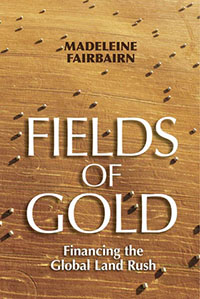 Assistant Professor Madeleine Fairbairn published her book Fields of Gold: Financing the Global Land Rush (Ithaca: Cornell University Press). This work examines the history, ideas, and political struggles surrounding the financialization of farmland and the implications of financiers' acquisition of land and control over resources for rural livelihoods and economic justice in both the US and Brazil. At the heart of Fields of Gold is a tension between efforts to transform farmland into a new financial asset class and land's physical and social properties, which frequently obstruct that transformation. Assistant Professor Fairbairn has a unique interest in those acquiring land, rather than those affected by land acquisitions, and this work sheds ethnographic light on the actors and relationships—from Iowa to Manhattan to São Paulo—that have helped to turn land into an attractive financial asset class. Fields of Gold is available in hardcover, paperback, and as an open access ebook, and was featured in a UCSC Newscenter article.
Assistant Professor Madeleine Fairbairn published her book Fields of Gold: Financing the Global Land Rush (Ithaca: Cornell University Press). This work examines the history, ideas, and political struggles surrounding the financialization of farmland and the implications of financiers' acquisition of land and control over resources for rural livelihoods and economic justice in both the US and Brazil. At the heart of Fields of Gold is a tension between efforts to transform farmland into a new financial asset class and land's physical and social properties, which frequently obstruct that transformation. Assistant Professor Fairbairn has a unique interest in those acquiring land, rather than those affected by land acquisitions, and this work sheds ethnographic light on the actors and relationships—from Iowa to Manhattan to São Paulo—that have helped to turn land into an attractive financial asset class. Fields of Gold is available in hardcover, paperback, and as an open access ebook, and was featured in a UCSC Newscenter article.
Assistant Professor Fairbairn was the lead author on the paper “In vino veritas, in aqua lucrum: Farmland investment, environmental uncertainty, and groundwater access in California’s Cuyama Valley,” published in Agriculture and Human Values. The paper explores the relationship between farmland investment and environmental uncertainty and how farmland investors seek to “render land investible” in spite of drought, groundwater depletion, and changing regulations.
Assistant Professor Fairbairn also co-authored “What owns the land: The corporate organization of farmland investment” in the Journal of Peasant Studies. In this paper, the authors devote attention to the mundane elements of investment in the global land rush, primarily the corporate structure that undergirds it. While the latest farmland investment has the fresh face of the “who”, such as private equity funds, the authors conclude that the “what” of its corporate skeleton is older, calling for dialogue between studies of corporate organization, landownership, and financialization.
Finally, in "Agri-food systems and the Anthropocene," published in Annals of the American Association of Geographers, Emily Reisman and Madeleine Fairbairn interrogate Earth-changing transformations in food and agriculture, arguing that agri-food systems serve as a through line to competing Anthropocene origin stories, a source of theoretical insight for the complexity of human–environment relations, and a site of agency for engaging alternative futures.
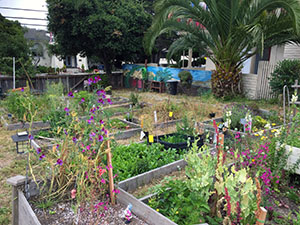 Professor Stacy Philpott published two new papers related to urban agroecology. In the first, “Gardener demographics, experience, and motivations drive differences in plant species richness and composition in urban gardens,” published in Ecology & Society, she and coauthors examine how plant richness and composition vary with gardener socio-demographic factors, gardening experience and garden use, and gardener motivations. They found that women plant more plant species than men, especially of ornamental plants, and individual gardeners motivated by building a connection to nature tend to plant unique or rare plants in their gardens. They also found that the gardeners’ region of national origin strongly influences the types of crops they choose to grow.
Professor Stacy Philpott published two new papers related to urban agroecology. In the first, “Gardener demographics, experience, and motivations drive differences in plant species richness and composition in urban gardens,” published in Ecology & Society, she and coauthors examine how plant richness and composition vary with gardener socio-demographic factors, gardening experience and garden use, and gardener motivations. They found that women plant more plant species than men, especially of ornamental plants, and individual gardeners motivated by building a connection to nature tend to plant unique or rare plants in their gardens. They also found that the gardeners’ region of national origin strongly influences the types of crops they choose to grow.
In a second paper, “Natural enemy–herbivore networks along local management and landscape gradients in urban agroecosystems,” published in Ecological Applications, Professor Philpott and coauthors examine the implications of these changes in plant communities and other local and landscape characteristics of urban gardens on ecological networks of pests and their natural enemies. They found that gardens with high plant and flower species diversity had higher parasitoid abundance and increased network vulnerability (both associated with improved pest control). They also found that high agricultural land‐use cover in the landscape surrounding urban gardens was associated with lower predator and parasitoid abundance, lower natural‐enemy : herbivore ratios, lower interaction richness, and higher trophic complementarity (all factors associated with lower pest control). Together, the two studies indicate that promoting human socio-demographic diversity in gardens may promote pest control services.
Assistant Professor Kai Zhu received a Tansley Medal based on the strength of his past scientific achievements, plus a review paper published in January 2020. In that paper, Zhu synthesized both his own work and emerging research across the field to propose a new framework for integrating the study of forest regrowth processes with the effects of environmental change. Both factors have important implications for the future carbon sequestration potential of forests.
Latin American and Latino Studies
Assistant Professor Jeffrey Erbig coauthored an article in the journal History Compass, “Still turning toward a cartographic history of Latin America.” This article takes stock of an interdisciplinary and international body of critical map histories that emerged in the 1990s and proliferated in the 2000s. It assesses the principal contributions of these works and identifies possible pathways for future scholarship on the history of cartography in Latin America.
Dr. Erbig was also interviewed by the New Books Network podcast about his recently published book, Where Caciques and Mapmakers Met: Border Making in Eighteenth-Century South America.
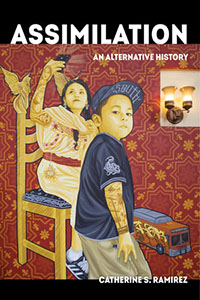 Professor Catherine Ramirez’s book, Assimilation: An Alternative History, has been published by the University of California Press. Assimilation explores the history of the concept of assimilation in the United States. It decouples immigration and assimilation and probes the gap between assimilation and citizenship to show how certain people who are not immigrants or who are not recognized as “real” or legitimate immigrants have been assimilated as racialized and subordinate subjects. Using archival sources and textual analysis, Dr. Ramirez studies the Carlisle Indian Industrial School, Booker T. Washington’s observations about immigration, narratives about African American racial passing, the connections between the figures of the Cold-War-era model minority and the twenty-first-century Dreamer, dissident Dreamers, and indigenous Oaxacan migration to Los Angeles. Ultimately, Assimilation argues that assimilation is not only a result of immigration; assimilation is also a consequence of indigenous dispossession, US imperialism, slavery, and an immigration apparatus that produces illegality. A relationship of power, assimilation is the process whereby the boundary between unequal groups and between inside and outside blurs, disappears, or, paradoxically, is reinforced.
Professor Catherine Ramirez’s book, Assimilation: An Alternative History, has been published by the University of California Press. Assimilation explores the history of the concept of assimilation in the United States. It decouples immigration and assimilation and probes the gap between assimilation and citizenship to show how certain people who are not immigrants or who are not recognized as “real” or legitimate immigrants have been assimilated as racialized and subordinate subjects. Using archival sources and textual analysis, Dr. Ramirez studies the Carlisle Indian Industrial School, Booker T. Washington’s observations about immigration, narratives about African American racial passing, the connections between the figures of the Cold-War-era model minority and the twenty-first-century Dreamer, dissident Dreamers, and indigenous Oaxacan migration to Los Angeles. Ultimately, Assimilation argues that assimilation is not only a result of immigration; assimilation is also a consequence of indigenous dispossession, US imperialism, slavery, and an immigration apparatus that produces illegality. A relationship of power, assimilation is the process whereby the boundary between unequal groups and between inside and outside blurs, disappears, or, paradoxically, is reinforced.
Cover image, appearing on list page and here:
Sonríe ahora, llora después / Smile Now, Cry Later (2017), by Tlacolulokos. Photo by Catherine S. Ramírez
Professor Ramirez also published two op-ed-style essays related to her book: “Essential and Excluded: The Paradox of Assimilation in the United States” and “For Hispanic Heritage Month: Why We Need to Build Toward a Latinx Future.” The former was published by the University of Southern California’s Equity Research Institute and the latter by the University of California Press blog.
Professor Ramirez’s essay, “Afrofuturism/Chicanafuturism: Fictive Kin,” was anthologized when it was reprinted in Autobiography without Apology: The Personal Essay in Chicanx and Latinx Studies (Los Angeles: UCLA Chicano Studies Research Center, 2020), edited by Chon A. Noriega, Wendy Belcher, and Charlene Villaseñor Black.
Finally, Professor Ramirez was interviewed on Science Friday about her work on Chicanafuturism—cultural production, such as literature, visual art, music, and performance, that explores the nexus of race, gender, science, technology, the environment, and the future from a decidedly Chicana vantage. She was also interviewed for articles that were published in Supermajority and the Spanish newspaper El Diario.
Professor Jessica Taft published a journal article, "Hopeful, harmless and heroic: Figuring the girl activist as global savior" in Girlhood Studies. The article analyzes media narratives about girl activists and explores how and why girl activists have become particularly desirable figures for public consumption. In the article, Taft argues that the encoding of girls as symbols of hope helps to resolve public anxieties about the future, while their more radical political views are managed through girlhood's association with harmlessness.
Professor Taft also published an article for KCET.org to accompany the station's documentary series on youth activism in California. The article, "How youth are taking the lead in issues local to global," argues that youth-led social movements are an expression of young people's collective desire for their voices to be heard and taken seriously by their elders and by their governments.
Professor Taft participated in a webinar on how to support young activists that was organized by EmbraceRace and was quoted in a National Geographic Family article for parents on children's political activism.
Politics
Assistant Professor Yasmeen Daifallah has received a prestigious National Endowment for the Humanities award to support advanced research toward a publication.
 Professor and Legal Studies Director Mark Fathi Massoud published "The rule of law in fragile states: Dictatorship, collapse, and the politics of religion in post‐colonial Somalia" in the Journal of Law and Society. Drawing from archival research and fieldwork in the Horn of Africa, he demonstrates how the rule of law in fragile states depends on religious politics, and how religion transforms law and society.
Professor and Legal Studies Director Mark Fathi Massoud published "The rule of law in fragile states: Dictatorship, collapse, and the politics of religion in post‐colonial Somalia" in the Journal of Law and Society. Drawing from archival research and fieldwork in the Horn of Africa, he demonstrates how the rule of law in fragile states depends on religious politics, and how religion transforms law and society.
Professor Massoud also appeared on BBC World News to discuss the White House announcement of a Sudan-Israel deal.
Assistant Professor Sara Niedzwiecki's book, Uneven Social Policies: The Politics of Subnational Variation in Latin America, was published in paperback by Cambridge University Press after two years of its initial publication in hardback. Uneven Social Policies shifts the focus of welfare state analysis away from policy design and toward policy implementation. By examining variation in political motivations, state capacity, and policy legacies, it explains why some policies are implemented more effectively than others, why some deliver votes to incumbent governments while others do not, and why regionally elected executives block the implementation of some but not all national policies.
Assistant Professor Niedzwiecki also published a coauthored article on the effects of government decentralization for explaining and producing language differences within countries around the world titled "Language Difference and Regional Authority," which was part of a broader collective work on the power of subnational regions.
Associate Professor Melanie Springer published "Why Georgia? A curious and unappreciated pioneer on the road to early youth enfranchisement in the United States" in the Journal of Policy History. This study presents a detailed historical analysis of the 1943 constitutional amendment that lowered Georgia’s voting age to 18; making it the first – and for 12 years, the only – state in the union to establish a voting age requirement below 21 years of age, during a time (and in a place) better known for electoral suppression than expansion. The paper highlights the dedication of Georgia’s young governor, Ellis Gibbs Arnall, and argues that Arnall’s political entrepreneurialism coupled with growing intraparty factionalism and strategic timing facilitated a rare instance of electoral progressivism in the Deep South. This work demonstrates that when enough of these elements come together in a particular context during a specific point in time, idiosyncratic things can—and do—actually happen, allowing for the possibility of progressive developments to occur even in traditionally inhospitable places and times.
Assistant Professor Anjuli Verma was a coauthor on an amicus brief filed in California Superior Court regarding the COVID-19 outbreak and genocidal human rights crisis in San Quentin State Prison. Regardless of the outcome, the brief itself documents for the record a range of specific institutional management missteps that point to California Department of Corrections and Rehabilitation (CDCR) leadership.
Psychology
Professor Nameera Akhtar published “Experiencing social connection: A qualitative study of mothers of nonspeaking autistic children” in PLOS ONE. Many people assume that autistic children are not interested in social interactions, which may become a self-fulfilling prophecy if it leads to people not interacting with autistic children, who then give up on trying to establish connections with others. This may be especially true in the case of children who cannot speak. Unlike many studies documenting "deficits" in autistic individuals, the authors of this paper were interested in what makes for positive interactions and relationships. In interviews for this study, mothers of nonspeaking autistic children described a range of both conventional and unconventional behaviors that indicated an interest in connection, but they also reframed behaviors others might see as undermining connection. They also expressed beliefs about their children's competence that enhanced their feelings of connection. It is hoped that these findings will help other parents perceive their children in more positive ways and ultimately lead to more satisfying relationships for both parents and children.
Assistant Professor Megan Boudewyn published a study, “Using prefrontal transcranial direct current stimulation (tDCS) to enhance proactive cognitive control in schizophrenia,” in the journal Neuropsychopharmacology. This preliminary study showed that tDCS, a non-invasive brain stimulation technique, can enhance a type of cognitive control often impaired in patients with schizophrenia. This study was featured in an eNews segment by the Brain & Behavior Research Foundation.
Dr. Boudewyn also received a research grant from the National Institute of Mental Health to study the effect of tDCS on cognitive control and attention lapses. This project will use tDCS and electrophysiology to study coordinated neural activity associated with these cognitive processes.
Professor Jean Fox Tree, worked with lead author and Ph.D. student Andrew Guydish and anticipated 2021 Ph.D. graduate Trevor D’Arcey to publish “Reciprocity in conversation” in the journal Language and Speech. As observed in similar studies, directors spoke more in on-task portions of the dialogue, but the authors newly found that, in off-task communication, followers spoke more than their directors and used a greater number of words per turn than their directors. This pattern is interpreted as reflecting behaviors leading toward balance in contributions across the conversation as a whole, a process the authors referred to as reciprocity in conversation.
Professor and Chair of Psychology Phil Hammack published four recent articles with graduate students in the Sexual and Gender Diversity Laboratory. In the first study of its kind, graduate student Logan Barsigian led the authorship team of a paper, “Narratives of gender, sexuality, and community in three generations of genderqueer sexual minorities,” published in Psychology of Sexual Orientation and Gender Diversity. The paper focused on generational differences in the experience of genderqueer people. Genderqueer people identify as nonbinary (i.e., neither man nor woman) and are increasingly recognized in cultural and scientific understandings of gender. The study found that genderqueer people struggled to understand their identities, given the binary nature of language about gender, but they found ways to reduce the impact of stigma through activism. Older generations reported more challenges finding community than younger generations.
Inspired by social change in cultural attitudes toward sexual diversity, Professor Hammack and colleagues published a paper in Developmental Psychology looking at differences in the timing of sexual identity milestones (e.g., age of “coming out”) in a nationally representative sample of sexual minorities. They found that key milestones are happening earlier in the life course for younger generations, as well as for those who use newer identity labels like “pansexual.”
A third paper from the lab examined whether the use of community sampling in sexual minority research can approximate probability sampling—the “gold standard” for social science survey research. The study, which was published in Archives of Sexual Behavior, found that community sampling tended to under sample bisexual people, those with less education, and those from rural areas.
Finally, a paper led by graduate student Sam Hughes was published in Journal of Sex Research, examining how kinky people talk about the origins of their desires.
Professor Regina Langhout and graduate student David L. Gordon published “Outcomes for underrepresented and misrepresented college students in service learning classes: Supporting agents of change” in Journal of Diversity in Higher Education. The article focuses on civic-engagement outcomes for students of color and first-generation college students who have taken (vs. haven't taken) a service learning course. Service learning courses are really important because they are one way campuses can make spaces more welcoming and relevant for students of color and first-gen. college students in the curriculum, as opposed to only co-curricular activities. Of course, co-curricular activities are important, but we can't really address the social climate on campus for students of color and first-gen. college students without also thinking about the curriculum. This paper indicates that the classroom needs to be welcoming first, and from that follows academic engagement and civic engagement.
Distinguished Professor Campbell Leaper recently published “Ambivalent sexism and reported relationship qualities in emerging adult heterosexual dating couples,” in Emerging Adulthood. The research was conducted with current graduate student Brenda Gutierrez and former graduate student Dr. Timea Farkas. Ambivalent sexism includes both hostile sexist attitudes (misogyny, male dominance) and benevolent sexist attitudes (protective paternalism, traditional gender roles). Unlike most prior studies, this research assessed the attitudes and experienced relationship qualities of both partners. Using dyadic analyses, the authors considered if sexist attitudes predicted either one’s own or the partner’s relationship experiences. They discovered that men’s hostile sexism predicted lower satisfaction and more conflict reported by both men and their partners. Conversely, men’s benevolent sexism predicted higher satisfaction and lower conflict reported by men and their partners. The findings underscore how men’s hostile sexism undermines relationship qualities for men as well as women. Whereas men’s benevolent sexism may be related to positive relationship qualities in dating relationships, these effects may reverse in long-term relationships for women as the costs of traditional gender roles become more apparent. Consistent with this proposal, relationship length was negatively associated with women’s endorsement of benevolent sexism.
Assistant Teaching Professor Hannah Raila published a case study, “Failure to launch: Separating from the mothership through a coordinated treatment for agoraphobia,” in the journal Cognitive and Behavioral Practice. It describes an innovative treatment of an adolescent with severe agoraphobia, which is the fear of being in public places due to the possibility of a panic attack. Treatment entailed separate yet synced sessions a) with the adolescent, which focused on exposure to feared situations, and b) with the parents, which focused on reducing accommodation of anxious behaviors in the home. The paper considers challenges of this approach and reports outcome measures that indicate that it led to successful symptom reduction.
 Professor Barbara Rogoff and colleagues published a handbook chapter on the centrality of innovation as a defining feature of ways of learning that are common in Indigenous communities of the Americas in the Handbook of the Cultural Foundations of Learning. The article contests a common assumption that, in Indigenous American communities, learning is simply a matter of adopting customary practices. Instead, the authors make the case that, in Indigenous ways of learning, change is continual, and individuals are appreciated for innovation. People learning from analysis and synthesis contribute innovations to their communities’ learning—for example, creating maize centuries ago, creating weaving techniques and patterns in recent decades, and currently innovating in cultivating pitahaya. The chapter includes insights from the authors' research and lived experience in different Indigenous American communities, led by Francisco Rosado-May (Yucatec Maya), along with Luis Urrieta Jr. (P’uhré), and Andrew Dayton (Cherokee). Original painting (c) Barbara Rogoff
Professor Barbara Rogoff and colleagues published a handbook chapter on the centrality of innovation as a defining feature of ways of learning that are common in Indigenous communities of the Americas in the Handbook of the Cultural Foundations of Learning. The article contests a common assumption that, in Indigenous American communities, learning is simply a matter of adopting customary practices. Instead, the authors make the case that, in Indigenous ways of learning, change is continual, and individuals are appreciated for innovation. People learning from analysis and synthesis contribute innovations to their communities’ learning—for example, creating maize centuries ago, creating weaving techniques and patterns in recent decades, and currently innovating in cultivating pitahaya. The chapter includes insights from the authors' research and lived experience in different Indigenous American communities, led by Francisco Rosado-May (Yucatec Maya), along with Luis Urrieta Jr. (P’uhré), and Andrew Dayton (Cherokee). Original painting (c) Barbara Rogoff
Assistant Professor Jeremy Yamashiro published the article “Biased collective memories and historical overclaiming: An availability heuristic account” in the journal Memory & Cognition. Cognitive psychologists have recently become interested in collective memories, or how people represent historical events relevant to their social identities. Using a memory retrieval fluency measure, Yamashiro and his coauthor Henry L. Roediger showed that people access historical knowledge asymmetrically, more fluently retrieving memories relevant to their own ingroup, versus outgroups. This asymmetry predicted the extent to which people overclaimed historical influence for their ingroup. Reducing asymmetrical accessibility through targeted retrieval of outgroup relevant events reduced chauvinistic historical overclaiming.
Also accepted were two book chapters in the upcoming volume National Memory in a Time of Populism, edited by Henry L. Roediger and James V. Wertsch, published by Oxford University Press. They include “Psychological aspects of national memory: An American case study” and “National and state narcissism as reflected in overclaiming.”
Sociology
Assistant Professor Naya Jones authored a critical essay on corner stores and racial profiling in Antipode Online, “Intervention – Corner stores, surveillance, and all black afterlives.” In addition to grappling with how to write about Black lives and death, the piece analyzes how corner stores have been sites of anti-Black violence as well as community-building. The piece provides historical background on corner stores and their prevalence in Black/African-American geographies. Jones addresses the widely publicized killing of George Floyd outside a corner store, as well as lesser-known violence against Black trans women in and around convenience retailers.
Assistant Professor Jones was also featured in a lead article, "Black food spaces seed sovereignty" in Toward Freedom. She sat down with the Garden Club of America (GCA) to talk about her research on African-American home gardens, botanical knowledge, and the Great Migration. This research is funded by the GCA's Anne S. Chatham Fellowship for Medicinal Botany.
Finally, Dr. Jones discussed collective healing and food sovereignty for The Checkout, a podcast that centers the voices and stories of working class and Black, Indigenous, and people of color communities at the frontlines of the food system.
Associate Professor Rebecca London published “Healthy, housed, and well-fed: Exploring basic needs support programming in the context of university student success,” in AERA Open. This paper focuses on the Slug Support program at UC Santa Cruz, as an example of meeting college students’ urgent food, housing, or financial hardships in an effort to help them remain and succeed in college. The authors identify the students who participate, their hardships and services received, and their retention over time. Students presented with issues in four main areas: food insecurity, mental health, multiple severe hardships, and need for one-time supports. In general, participants were retained at lower rates than the campus average, which is to be expected given their severe hardships. However, those who enrolled in the Supplementation Nutrition Assistance Program (SNAP) were retained at higher rates, on par with or higher than university-wide retention. California has amended SNAP regulations to waive work requirements for low-income students, making it easier for college students to qualify.
Assistant Professor Juan Pedroza won a research award through the University of Wisconsin–Madison’s Institute for Research on Poverty, with a goal of expanding antipoverty research capacity. Through the Emerging Poverty Scholars Fellowships, he will be focused on studying antipoverty policies and programs.
Associate Professor Veronica Terriquez published an article with UCSC graduate students Randy Villegas (Politics), Roxanna Villalobos (Sociology), and Jiayi Xu (Economics) that examines political socialization and voter mobilizations efforts among Latinx young voters in the Central Valley. The article, title “The political socialization of Latinx youth in a conservative political context,” can be found in the Journal of Applied Developmental Psychology.
Associate Professor Terriquez also published several research reports with students, including "The LA youth vote and the activation of a young and diverse electorate," with Steven Carmona Mora, UCSC sociology alumnus (class of 2017). This research was also mentioned in an op-ed published in The Hill, "To beat Trump, Democrats must mobilize young people."
Other papers include "99Rootz: Building a youth movement in the Central valley," published with Angelina Santiago, Psychology alumna (class of 2018); and "Orange County’s diverse young voters exercise their voice at the ballot box," with Jody Vallejo and Jiayi Xu (Economics Ph.D. student).
Finally, Professor Terriquez was a consultant producer on a PBS KCET documentary, Youth and Democracy that is accompanied by her essay "On the Shoulders of Giants: The Lineage and Growth of California’s Intergenerational, Multiracial Youth Movement."
